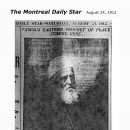Main menu
- ‘Abdu’l-Bahá’s Journey
- World Peace
- Stopping Racism in America
- Empowerment of Women
- More Principles...
- Prayer for America
Famous Teacher Coming
‘Abdu’l-Bahá, Oriental Prophet, and Leader, Here Soon.
HEAD OF WORLD-WIDE “BAHAI” PEACE CULT
Unity of All Religion and Universal Peace is His Gospel.
‘Abdu’l-Bahá, one of the supreme religious figures of the Orient, and known the world over as the head of the Bahá’í movement, with over three million followers in his native Persia alone, will arrive in Montreal about the end of August, to remain in the city for about a week.
For several months past ‘Abdu’l-Bahá has been in the United States, addressing large gatherings in New York, Boston, Philadelphia, Washington, Chicago, Cleveland, Pittsburg, and other cities. He also addressed the Lake Mohonk Peace Conference and at present he is attending the Greenacre Conference. During his stay in Montreal he will address several public meetings definite announcement of which will be made later.
Just before coming to America, ‘Abdu’l-Bahá visited London, where he spoke in St. John’s Church, Westminster, walking hand in hand up the nave with Archdeacon Wilberforce, and in the City Temple, where the Rev. R. J. Campbell introduced him as the leader of one of the most remarkable religious movements of this or any other age. In Paris a short time before that he spoke from the pulpits of Charles Wagner and Pere Hyacinthe.
THIRD GREAT TEACHER OF THE MOVEMENT.
‘Abdu’l-Bahá, or the “Servant of God,” is now sixty-eight years of age and patriarchal in appearance. He is the third of the great teachers of the Bahá’í movement. His predecessors were his father, Bahá’u’lláh, the great prophet of the faith, who died at Acca, in Syria, in 1892, at the age of 75, after having suffered imprisonment for forty years, at the instigation of the Mohammedan clergy, who saw their occupation gone if his principles triumphed; and Mohammed Ali, the foreteller of Bahá’ísm, known as “the Báb,” or “the Gate,” a young man of great religious fervor and eloquence, who was executed in Persia many years before, after a brief, but memorable crusade. ‘Abdu’l-Bahá himself has spent the greatest part of his life in prison, mostly at Acca, his release coming in 1908 on the downfall of Sultan ‘Abdul Hamid in Turkey. The movement has spread in the East, in the face of the most bitter persecution. In Persia alone between twenty and thirty thousand men and women have suffered martyrdom.
From his father, ‘Abdu’l-Bahá or Abbas Effendi as he was known before his accession to the leadership, received instruction, and early in life he acquired the power he manifests to-day of meeting people of every race and faith and class. Early too, he manifested evidence of the extraordinary knowledge and wisdom by which all people who meet him are impressed, whether they acknowledge his spiritual standing or not.
Not long before the downfall of Sultan ‘Abdul Hamid, the persecution of the Bahá’ís was renewed with horrible barbarity, and ‘Abdu’l-Bahá awaited sentence of death with absolute equanimity, when the Young Turks achieved their triumph and the tyrant found himself hurled from his throne.
Since his release ‘Abdu’l-Bahá has spent a considerable part of his time in travel. He has been deeply impressed by his tour of the United States, and is looking forward with a great interest to his visit to Canada. The movement has many adherents in this country, quite a number of them in Montreal. While here, ‘Abdu’l-Bahá will stay at 716 Pine Avenue West. All who wish to visit him will be made welcome, if arrangements are made beforehand by telephoning Uptown 3015.
TO ESTABLISH RELIGIOUS UNITY UPON EARTH.
The great aim of the Bahá’í movement is explained as the establishment of peace and religious unity in the world. It has no clergy and no ritual. It is not a cult; and to be a Bahá’í it is not necessary to cut away from one’s religious affiliations. On the contrary, each man is asked to cling more closely to his own church or faith and work to purify, enlarge and spiritualize into the larger unity the expression of each particular belief. What is sought is the spiritual unification of all mankind without subversion of existing creeds. Everyone must do the greatest amount of good within his power and work unceasingly for the peace of the world and the unity of the human race.
The great historic religions of the world are proclaimed to have all come from God, as the one divine source of all truth; that truth is perceived by mankind in different ways, and each has its own revelation. Hence the real unity of all faiths, as given from age to age by Abraham, Moses, Jesus, Zoroaster, Buddha, Mohammed and Bahá’u’lláh. The one point insisted upon is that the fundamentals of spiritual teaching shall be universally admitted and practically applied to the affairs of daily life and in the social, business and political life of nations.
“War must cease,” ‘Abdu’l-Bahá declares. “There is something above and beyond patriotism, and it is better to love your fellowmen than to love only your countrymen. When we see this and know in very truth the brotherhood of man, war will appear to us in its true light as an outrage on civilization, an act of madness and blindness. If the hand fights against the foot all the body must suffer, and no one’s part can possibly be the gainer. When the light drives away our present darkness, we shall recognize that we were like men in a dungeon, fighting and slaying ourselves.”
[picture caption: FAMOUS EASTERN PROPHET OF PEACE COMING HERE. ‘Abdu’l-Bahá, “Servant of God,” head of the world-wide Bahá’í movement, who will be in Montreal next week.]



.png)





